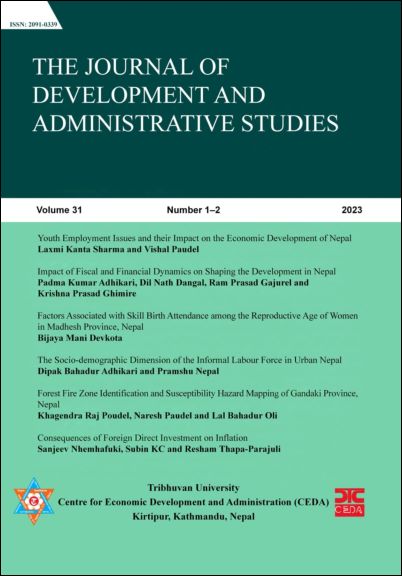Factors Associated with Skill Birth Attendance among the Reproductive Age of Women in Madhesh Province, Nepal
DOI:
https://doi.org/10.3126/jodas.v31i1-2.72231Keywords:
SBA, Madhesh Province, Factors association, Women, UtilizationAbstract
Skilled birth attendance (SBA) is vital for reducing maternal and neonatal mortality. Despite national efforts, disparities in SBA utilization persist, influenced by socio-demographic factors such as socioeconomic status, education, and geographic location. This study utilized data from the 2022 Nepal Demographic and Health Survey (NDHS) involving 734 women of reproductive age in Madhesh Province. Logistic regression was applied to determine the influence of variables like age, birth order, religion, caste/ethnicity, educational attainment, place of residence, and wealth index on the likelihood of SBA-assisted delivery. The analysis revealed significant predictors of SBA utilization. Women aged 30-49 were more likely to utilize SBA services (OR = 3.111, p = .023). Higher birth order was associated with a decreased likelihood of SBA utilization (OR = .15, p < .001), indicating that experience with childbirth might influence the perception of need for skilled attendance. Women with higher educational attainment showed a greater probability of SBA-assisted delivery (OR = 3.983, p = .035), emphasizing the role of education in health service utilization. Additionally, wealth was a strong predictor, with the richest women showing the highest likelihood of SBA assistance (OR = 5.755, p = .004). Contrarily, variables such as rural residence and certain caste/ethnicity groups did not significantly predict SBA usage. The study underscores that age, educational attainment, and wealth are significant determinants of SBA utilization. These findings highlight the need for targeted interventions to enhance maternal health services, focusing particularly on educational and economic empowerment to bridge the utilization gap. The insights provided could inform policy makers and health practitioners in designing interventions that cater to the diverse needs of the population.
Downloads
Downloads
Published
How to Cite
Issue
Section
License
The copyright of the accepted articles is reserved by the Centre for Economic Development and Administration (CEDA), Tribhuvan University (TU). No part of the article published in this journal should be reproduced except provided by the law currently in force without the written consent of the centre.




